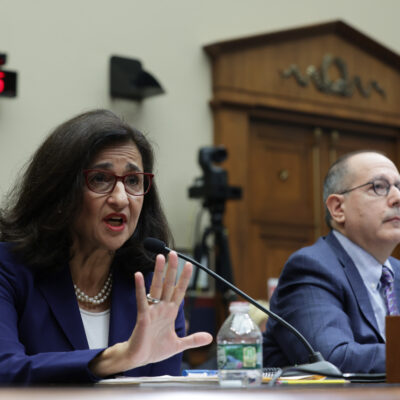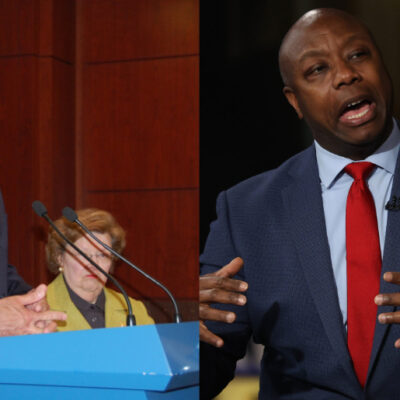‘No timelines’ on adding Israel to Visa Waiver Program, senior DHS official says
Israeli Interior Minister Ayelet Shaked claimed the country would be added by 2023

Gil Cohen Magen/Xinhua via Getty Images
People wait at the departure hall at Ben Gurion International Airport near Tel Aviv, Israel, Nov. 28, 2021.
There are “no timelines announced” on when Israel will be added to the U.S. Visa Waiver Program, Department of Homeland Security Under Secretary for Policy Rob Silvers told Jewish Insider on Friday, adding that including Israel in the program is a “high priority” for the department.
“We strongly support Israel’s efforts to join the Visa Waiver Program. We can’t think of a more exciting result than welcoming Israel into the program,” Silvers noted. “To do that, it will have to meet all the requirements for program participation.”
Silvers’s comments follow those made by Israeli Interior Minister Ayelet Shaked, who said in November that she expects Israel to be added to the program by 2023. Shaked discussed the issue with Homeland Security Secretary Alejandro Mayorkas and Silvers in Washington last month.
Senior officials from DHS and Israel’s Interior Ministry have been in negotiations about how Israel can comply with the legal requirements to join the program, which would allow Israelis to travel to the U.S. without a visa.
One key issue is reciprocity, which requires Israel to allow all American citizens to enter Israel — including those of Palestinian descent, who have sometimes experienced difficulty entering and leaving the country.
“We will continue to work with Israel towards fulfilling the reciprocity requirements for Americans seeking to enter or transit to Israel,” Silvers explained, adding that the provision requires “equal treatment of all Americans.”
“At this point, the Israelis, we think, understand what the program rules are, and we’re going to work with them to evaluate their proposals for how to get there.”
“It’s a really high priority for us to make it happen as soon as possible,” said Silvers. “I expect you’ll see a continued very high-level diplomatic engagement between our department and the government of Israel to continue working on this in the coming months.”
The percentage of rejected Israeli visa applicants also remains too high, presenting another challenge. Federal law states that countries can only be added to the Visa Waiver Program when the U.S. rejects 3% or less of visa applications, and figures from the State Department show that the most recent visa refusal rates for Israel were 6.52% in 2020 and 5.33% in 2019.
“We’ve been working actually very closely and productively with both our embassy and in Jerusalem, and also with our Israeli government counterparts to understand what might be driving their visa refusal numbers, and if there are ways that together, we can drive those numbers down in an appropriate way,” said Silvers, who also held roles at DHS during the Obama administration.
Prior to joining the Biden administration, Silvers served on a National Security Advisory Council convened by the Secure Community Network, a nonprofit dedicated to the safety and security of Jewish organizations.
Major American Jewish organizations have lobbied to increase funding for the federal Nonprofit Security Grant Program, which gives nonprofits funds to use for security needs, from the current $180 million to $360 million. The Federal Emergency Management Agency, which oversees the program, approved less than half of grant applications this year. (If passed, the Build Back Better bill will add $100 million to the program.)
During his Senate confirmation hearing in May, Silvers expressed a commitment to strengthening the program. “I absolutely commit to you that if I am confirmed, I will work to strengthen the Nonprofit Security Grant Program in any way I can, and even further,” he said in response to a question from Sen. Jacky Rosen (D-NV).
DHS did not request a specific funding amount for the program in this year’s budget. “The program has grown and that we’ve expressed a support for it to continue to grow,” Silvers said.
“I think when I left the department, it was like $25 million or something like that. So it’s really grown, and we’re constantly evaluating whether we should advise further growth,” Silvers noted.
Silvers served as Assistant Secretary of Homeland Security for cyber policy from 2016 to 2017, capping off six years and several different roles at DHS under Obama. He will be a keynote speaker at Cybertech Global’s Tel Aviv conference in January.
“The Israeli cyber ecosystem is unique and incredible,” Silvers said. “They’ve been great partners of ours in cybersecurity, and while there, [I’m] looking forward to engaging with Israeli government counterparts and industry as well.”








